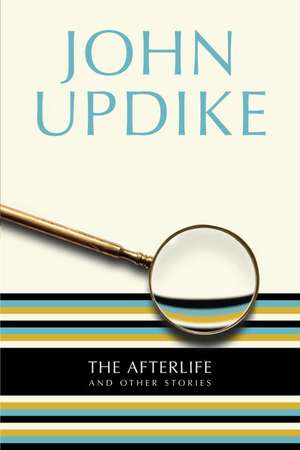The Afterlife: And Other Stories
Autor John Updikeen Limba Engleză Paperback – 31 iul 1996
Preț: 90.35 lei
Nou
Puncte Express: 136
Preț estimativ în valută:
17.29€ • 18.79$ • 14.54£
17.29€ • 18.79$ • 14.54£
Carte indisponibilă temporar
Doresc să fiu notificat când acest titlu va fi disponibil:
Se trimite...
Preluare comenzi: 021 569.72.76
Specificații
ISBN-13: 9780449912010
ISBN-10: 0449912019
Pagini: 336
Dimensiuni: 140 x 202 x 24 mm
Greutate: 0.32 kg
Editura: Random House Trade
ISBN-10: 0449912019
Pagini: 336
Dimensiuni: 140 x 202 x 24 mm
Greutate: 0.32 kg
Editura: Random House Trade
Notă biografică
John Updike was born in Shillington, Pennsylvania, in 1932. He graduated from Harvard College in 1954 and spent a year in Oxford, England, at the Ruskin School of Drawing and Fine Art. From 1955 to 1957 he was a member of the staff of The New Yorker. His novels have won the Pulitzer Prize, the National Book Award, the National Book Critics Circle Award, the Rosenthal Foundation Award, and the William Dean Howells Medal. In 2007 he received the Gold Medal for Fiction from the American Academy of Arts and Letters. John Updike died in January 2009.
Recenzii
“Marvelously moving . . . These tales evoke a certain peace and a definite wonder at what an astonishingly graceful writer Updike is.”—USA Today
“Quintessential Updike . . . These tales are elegies for lost youth and receding passions.”—Michiko Kakutani, The New York Times
“If one trait can account for John Updike’s staying power, it is the man’s exquisite grasp of ordinary miracles. . . . With his small mirages, his puddles left by both the heroic and the damned, Updike can turn the simple, misguided efforts of a man into a signature of song.”—The Boston Globe
“Quintessential Updike . . . These tales are elegies for lost youth and receding passions.”—Michiko Kakutani, The New York Times
“If one trait can account for John Updike’s staying power, it is the man’s exquisite grasp of ordinary miracles. . . . With his small mirages, his puddles left by both the heroic and the damned, Updike can turn the simple, misguided efforts of a man into a signature of song.”—The Boston Globe
